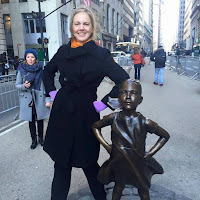I easily admit that I am not the most
'aware' person. At times, I can overlook the blatantly obvious.
A few weeks ago, for instance... I was attending a session in a shoe-free zone,
and when I looked down at my crossed feet, noticed a hole in my sock. A reasonable
size, it was unlikely to have just popped up during the morning. How had I
missed that when I put my socks on?!
I changed the crossing of my legs, not
wanting to show the room my hole-y sock. Imagine my surprise, doubled, when I
looked and saw that the other sock
also had a hole in its heel.
This led me to reflect on what else I could be missing in my life. What else was happening, that would have been obvious and
apparent, had I been open and aware to it?
The holes in my socks had not just happened
suddenly; they must have been wearing down over time. I do not dress in the
dark, so I could have seen the holes at any time. Why did it take a time when
there was nothing else happening to notice that something so basic was left
wanting attention?
So too, our spiritual journey is one that
wants regular reflection and care. Is our prayer life in good status? Is it
wearing in places? Are we looking for places of weakness in order to be more
gentle with ourselves in those places? Are we looking to strengthen and
maintain other areas? Are our practices just routine enough that we assure
ourselves we have done them? Are we intentionally going sufficiently deep
within ourselves to seek out this awareness? Are we spending enough time to be carefully reflective, amidst the busyness of life?
Whatever our journey, we know we can always do better. Our practices can always use attention, and maybe change. Spiritual direction, the Ignation Examen, Centering Prayer, Labyrinth walking - whatever the format (or combinations thereof), we are challenged to greater awareness of self and of God; to our own benefit and to the benefit of the broader community.
Wherever we are on our journey, we know we are walking with God. My
prayer is that my journey will be in better repair than my socks!





